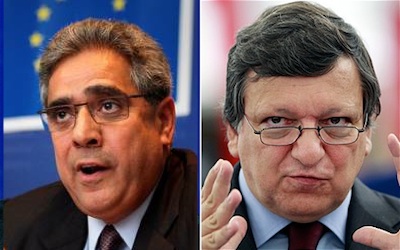
The day-to-day oversight of the finances of the 26-County state by international ‘bailout’ loan managers ended this week in a verbal tussle over who should have shouldered the cost of the collapse of the state’s banks.
While Taoiseach Enda Kenny made a self-congratulatory televised state address last weekend to ‘thank’ the Irish public for accepting severe cuts and taxes with little protest, Ajai Chopra, the lead official from the International Monetary Fund (IMF), said the Irish people had been treated unfairly.
Mr Chopra, who played a central role in designing Ireland’s bail out, criticised the failure of the Dublin government and the European Union to require international capitalists who had sought to exploit the eurozone money bubble in Ireland -- the bondholders of its bust banks -- to accept losses on their investments.
“It is unfair to impose the burden of supporting banks primarily on domestic taxpayers while senior unguaranteed bank bondholders get paid out. This not only adds to sovereign debt, but it also creates political problems, making it harder to sustain fiscal adjustment,” he said.
In an interview to mark his departure from Ireland after three years, Mr Chopra, who is also retiring from the IMF, said eurozone policy was now changing, although at too late a stage for Ireland.
“Imposing losses on senior bank bond holders is now becoming more accepted,” he said.
In a rebuke to Mr Chopra, the European Commission president, Manuel Barosso, blamed the crisis on the failure of the 26-County state to regulate its banking sector, not the EU’s inflationary monetary policy.
Asked whether Ireland should be entitled to retroactive debt relief -- worth tens of billions of euro if international banking debts are shouldered by the EU instead -- Barroso said the problems that were created in Ireland were not the result of European Central Bank policy, but that of the coalition governments in Dublin.
“In fact it was the Irish banks that created a big problem for Ireland but also the other countries in the euro area. This should be taken into consideration,” he said.
Barroso said that there had been a “major destabilisation of the euro area” which had resulted from events in the Irish banking sector, and this had “happened under the responsibility of the national authorities of Ireland and the national supervisory entities.”
Sinn Fein leader Gerry Adams said the EU Commission President had appeared to be definitively ruling out retroactive recapitalisation of Irish banks.
The current Fine Gael-Labour government, which has always suggested the EU would accept their share of Irish banking debt, had been left “badly exposed”, he said.
“This Government has, once again, miserably failed to defend and promote the interests of Irish citizens.”
FRAUDS CONTINUE
And as if to prove Barroso’s point, the ‘bad bank’ set up by the 26-County government to take over the debts of Ireland’s collapsed banking system, has now itself become hopelessly corrupt, according a former senior executive.
Enda Farrell, a former senior executive at NAMA (the National Assets Management Agency) this week alleged widespread breaches of the law within the agency.
Mr Farrell said there had multiple high-level briefings and leaking of information from within the organisation to favoured third parties. In documents, the former senior executive gives his account of his time at NAMA and how insiders had abused commercially sensitive information worth millions.
The scandal comes amid a growing public awareness of the scale of lawlessness in Irish boardrooms. Reports have continued to expose how large sums of money are being routinely appropriated by the directors of state-funded organisations as personal “bonus” payments. One such organisation, St Vincent’s Private Hospital, was now also been accused of making a direct attempt to defraud the state through falsifying the cost of medications.
![[Irish Republican News]](https://republican-news.org/graphics/title_gifs/rn.gif)
![[Irish Republican News]](https://republican-news.org/graphics/title_gifs/harp.gif)

